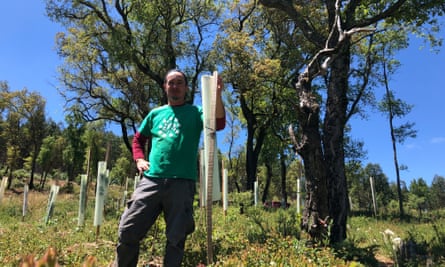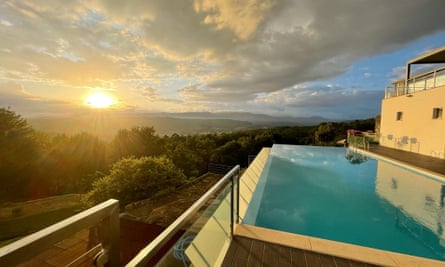My volunteer trip to help revive a fire-ravaged Portuguese forest | Holidays in Portugal
Jhe gently sloping valley floor below the village of Ferraria de São João is so green and lush that you might imagine insects would have to line up to take their turn in its Arcadian abundance. The birds are singing, the bees are buzzing and the meadow grasses soar towards an azure sky.
It has not always been so. Antonio Zuzarte remembers how, five years ago, a violent forest fire reduced the landscape to a scorched and blackened wasteland. Everything was reduced to ashes, he said – the trees, the crops, the animal life.
“For weeks, a pungent smell hung in the air,” says Zuzarte, a telecommunications engineer. “And the silence too: it must have been at least a year before the birds returned to the village.”
Ankle-deep in water, he drives a shovel into a bank of silty mud while talking. Along with a dozen villagers, Zuzarte is part of a conservation volunteer group in Ferraria.
Spurred on by the ecological devastation caused by the fire, the group meets every two months to plant new trees, keep the ground clear of fallen branches, and generally help return their valley to its former verdant self.
Today is ditch cleaning day. An old irrigation canal and holding tank are clogged with weeds and sediment, and members of the Aldeia Viva (living village) set aside a Sunday morning to clean it up.
An empty wheelbarrow rests at the edge of the foot-deep stream, its cargo of sharp hoes and spiked reed pullers divided among the volunteers.
I’m here to lend a hand. Forest fires are, unfortunately, a predictable phenomenon here in Portugal. For a few months each summer, the television news fills with images of burning trees, and the nation cries and protests. But then time turns and it’s forgotten for another year.
Last summer reached a brand new level, but. With fires raging from Spain and France to Italy and Romania, it looked like half of Europe was going up in smoke. It was no longer fair to moan from the sofa: I needed to do my part.

Leaving Porto on a Friday afternoon, I drove south to the pretty mountain town of Vouzela, where I broke off my journey in the restored village Hotel Paco da Torre, which dates from the 15th century. Constructed from the same dusty gray granite and quartz that jut out into the surrounding Serra do Caramulo, the eight-room property overlooks a garden of oak, laurel, and fruit trees.
Along the way, I stopped for a walk around Camarinho Botanical Reserve, a 24-hectare conservation area teeming with native and exotic trees. Leonor Alcoforada, my guide, points out maritime pines, common alders and cork oaks – sobreiros – among others.
In the spotlight are rhododendron bushes, a throwback to when this corner of southern Europe was covered in subtropical rainforest. Other than in a small corner of the Algarve, this woody native plant, Pontic rhododendronis no longer found anywhere else in Portugal.
“We have a project with the local school to collect seeds from our native plants and trees,” says Alcoforada. “We keep them in the nursery and then replant them in early fall.”
Unlike Alcoforada, Ferraria volunteers are not specialists. They represent a cross section of society, so I bet they know as much about dendrology (the study of trees) as I do – which is muito pouco. But they’ve seen firsthand the damage wildfires can cause and are inspired to dedicate themselves to cleaning up the mess and restoring what they can.
We are not totally uneducated, however. João Amilcar, an energetic expert from the municipality, is there to guide us on what weeds to pull and what sediment to remove. Tiring as the cleaning of the ditches proves, the day passes on a soundtrack of chatter and laughter.
On the road inland, I was reminded at almost every turn of Portugal’s status as a nation of trees. Just under two-fifths of the country’s landmass is classified as forested (triple the UK’s figure). At their best, in natural and national parks like Peneda-Gerês, Montesinho and Sintra-Cascais, these forests are an arboreal delight.
Most, unfortunately, are not. A cash cow for rural landowners, expanses of eucalyptus and pine crowd around isolated villages such as Ferraria. These monocultures not only reduce local biodiversity, but pose a huge fire threat.
Portugal suffered 150 separate wildfires in the same month when flames engulfed the home village of Zuzarte. In the nearby town of Pedrógão Grande, such a blaze claimed 66 lives – the country’s deadliest wildfire to date.
In Ferreria, people took immediate action. For weeks after the fire, volunteers clubbed together to clear the area immediately around the village of eucalyptus trees. In a buffer zone of 100 meters they managed to remove the stumps of more than 50,000 individual trees that had burned.
What started as a disaster response has since turned into a community activity. Not once during our morning of pulling weeds and shoveling silt did the laughter of the volunteers stop.

After four hours, the holding tank gradually begins to fill. Tired but satisfied, we return to the village for a hearty lunch of tuna, beans and local cabbage, all washed down with a local Beira wine.
“Come back whenever you want,” Zuzarte says as everyone gets up to leave. “And bring whoever you want.” My mind turns to my green-fingered friends. Count on me, I tell him.
Accommodation

Paço da Torre, Figueiredo das Donas, Vouzela Double rooms from 86 € a night, +351 968 710 052, pacodatorre.pt
Hotel Convento da Serta, Serta Doublefrom 120 € a night, +351 274 608 493, conventodasertahotel.pt/en
This trip was supported by the Central Portugal tourist office and led by Tours in Madomis
Nature volunteering opportunities in Europe
Conservation of turtles: Greece Join other environmental enthusiasts to study and protect turtle nests on the golden beaches of Kefalonia. As part of the experiment, volunteers help protect newly hatched turtles from light pollution and ensure they can crawl safely out to sea.
April-October, from £595 to two weeks, will work abroad.com
Search for dolphins: Italy Collecting data on the population sizes, social structures, habitat use and acoustic repertoire of Ischia’s short-beaked dolphins is essential to protect this highly prized cetacean. From the deck of a 1930s wooden cutter, GoEco invites volunteers to help contribute to this vital scientific research.
May-September, €1,125 to six days, family options available, goeco.org
Protection against wolves: Slovakia In the pristine winter wilderness of Slovakia’s Liptov region, join experienced conservationists as they do your part to protect the country’s wolf and lynx populations. Activities include setting camera traps and collecting DNA samples.
December-February, at least one week, from 950 €, natucate.com
Equine care: Spain In the small village of Atajate, near Málaga, the Time and Space Equine Education Sanctuary invites volunteers to help care for their small herd of seven horses. In addition to feeding and cleaning the animals, participants can learn powerless horse techniques using positive reinforcement.
All year, one week minimum, from €612, www.voluntariatmonde.com
Small forests: UK The charity Earthwatch Europe offers one-day tree planting opportunities across the UK. Inspired by the Japanese botantist Dr Akira Miyawakithe Tiny Forest program focuses on creating timber from fast-growing native species in urban areas.
To free, earthwatch.org.uk


Comments are closed.